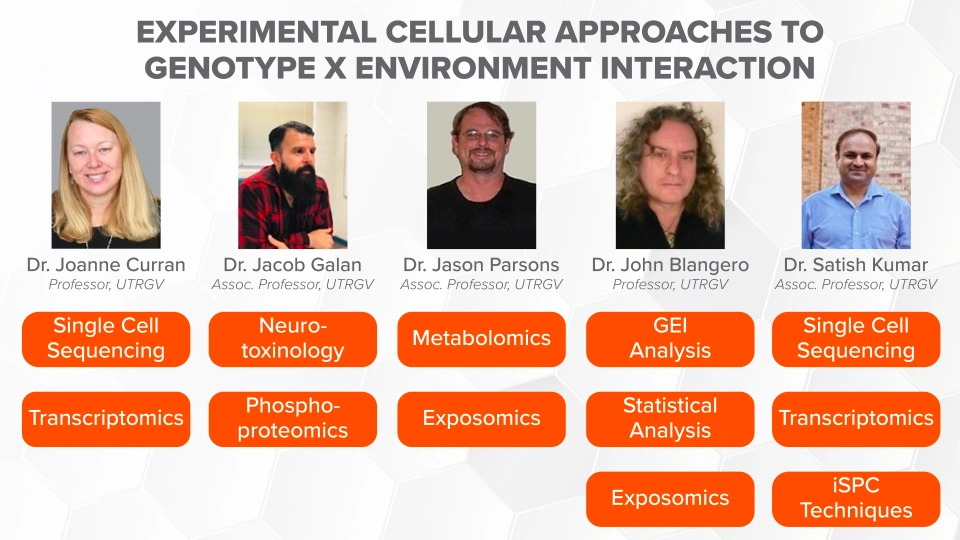By Saira Cabrera
RIO GRANDE VALLEY, TEXAS – SEPT. 19, 2023 – The National Institutes of Health (NIH) recently awarded the UTRGV School of Medicine's Department of Human Genetics $8 million to conduct the first and largest study of its kind into environmental impacts on genotype.
This award – the "Experimental Cellular Approaches to Genotype × Environment Interaction" –will model human Genotype × Environment Interaction (GEI) in South Texas.
Dr. Joanne E. Curran, professor of Medicine in the Division of Human Genetics at the UTRGV School of Medicine’s new Department of Primary and Community Care and the principal investigator for the grant, said the interaction of genes and the environment is reflected in an individual's outward response to disease.
“The whole concept behind this investigation is what we call genotype by environment interaction,” she said. “In lay terms, it means that everybody responds differently to an environmental insult. Everybody responds differently to an environmental target, such as a spider bite, a snake bite, or exposure to the sun. Your genetic makeup can determine part of that reaction and influence how you respond."
The grant funding will help develop an innovative approach to investigating human GEI, to understand the causes of adverse reactions from external aggravators, like snake bites, pollutants, or allergens, and how that correlates with individual genes and responses.
This specific research is focused on the Hispanic/Latino communities of South Texas.
Curran and a team of researchers hope to understand these responses and create faster-acting treatments for snake bites (rattlesnakes) and common pollutants such as those from vehicle exhaust and cigarette smoke.
FOR THE RGV
Curran said it can be challenging to study controlled environmental exposures in humans directly.
“Thus, we propose using induced pluripotent stem cell (iPSC) derived cells – those are cells that can self-renew by dividing and developing into the three primary groups of cells that make up a human body – to study the genetic response to cellular stress to avoid these challenges. We're looking at the genetic makeup of individuals to see if they vary and how they respond to these environmental challenges," she said.
In this research, UTRGV researchers will use environmental aggressors relevant to the area and its population.
“Locally, we're investigating the pollutant challenge generated from cigarette smoke, vehicle exhaust and the burning of wood,” Curran said. “That is something that people get exposed to easily. Statewide, for Texas, we'll be researching rattlesnake venom."
The investigations will help find solutions to address reactions in this specific population and how that can be used in a novel treatment method, develop a biomarker, or acquire molecule understanding that will lead to more efficient and less expensive treatments.
TEAM SCIENCE
Curran called this $8 million NIH grant a "great example of team science" in which a diverse group of scientists with varied expertise come together to develop a novel project that can have an impact on communities not just locally but across Texas, as well.
Other principal investigators from UTRGV include:
- John Blangero, Ph.D., UTRGV School of Medicine, South Texas Diabetes and Obesity Institute.
- Jacob Galan, Ph.D., UTRGV School of Medicine, Division of Human Genetics in Department of Primary and Community Care.
- Satish Kumar, Ph.D. UTRGV School of Medicine Division of Human Genetics in Department of Primary and Community Care.
- Jason Parsons, B.Sc., Ph.D. UTRGV School of Earth, Environmental, and Marine Sciences.
- Elda Sanchez, Ph.D. and grant co-investigator, from the National Natural Toxins Research Center at Texas A&M University Kingsville.
Dr. Michael B. Hocker, senior vice president for UT Health RGV and dean of the UTRGV School of Medicine, said this NIH award is evidence of the amazing work being done by faculty at the School of Medicine.
“These efforts will continue to advance the School of Medicine's mission to improve health through life-changing research, not only in the region but nationwide, by investigating the environmental and genetic factors of disease for our specific communities,” he said. “It will facilitate synergies in research that will further our school's focus on health and disease in the RGV and Texas populations.”
ABOUT UTRGV
The University of Texas Rio Grande Valley (UTRGV) was created by the Texas Legislature in 2013 as the first major public university of the 21st century in Texas. This transformative initiative provided the opportunity to expand educational opportunities in the Rio Grande Valley, including a new School of Medicine and a School of Podiatry, and made it possible for residents of the region to benefit from the Permanent University Fund – a public endowment contributing support to the University of Texas System and other institutions.
UTRGV has campuses and off-campus research and teaching sites throughout the Rio Grande Valley including Brownsville (formerly The University of Texas at Brownsville campus), Edinburg (formerly The University of Texas-Pan American campus), Harlingen, Weslaco, McAllen, Port Isabel, Rio Grande City and South Padre Island. UTRGV, a comprehensive academic institution, enrolled its first class in the fall of 2015; the School of Medicine welcomed its first class in the summer of 2016, and the School of Podiatric Medicine in the fall of 2022.


